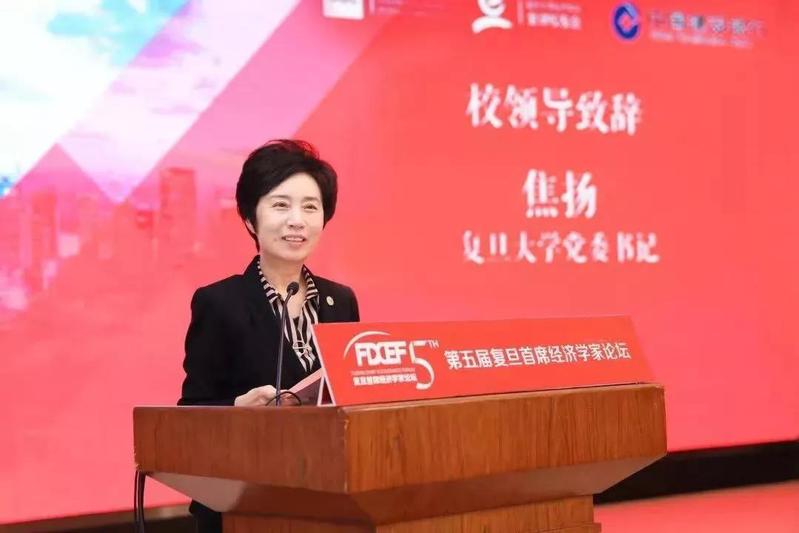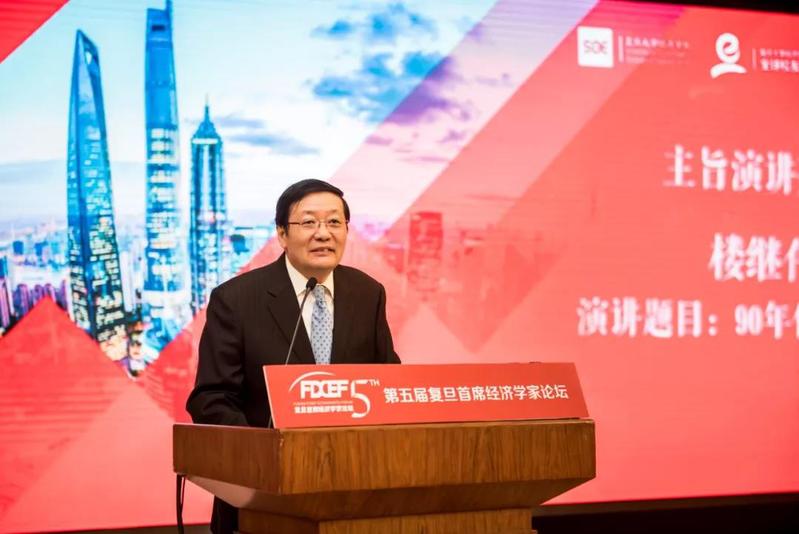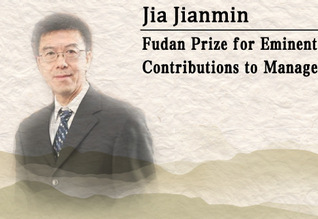On October 26, the Fifth Fudan Chief Economists Forum was held at Fudan. Under the theme “70 Years of Chinese Economic Growth and All-around Opening-up”, the forum reviewed the 70 years’ course of economic development in China, looked into its future and focused on its crucial task of economic development. A great number of well-known economists attended the forum, sharing insights on economic development strategies against the backdrop of the all-around opening-up.

Jiao Yang, Chairperson of the University Council, delivered opening remarks. She said that universities were charged with the task of theoretical innovation and talent training. With its good traditions and profound knowledge in the field of economics, Fudan would accelerate the construction of a world-class school and a discipline of economics with Chinese characteristics, make more breakthroughs in theoretical innovation, talent training, think tank development and international cooperation leveraging the platforms such as Fudan Chief Economists Forum.

Huang Zhiling, Chief Economist of China Construction Bank (CCB), looked back at the cooperation between CCB and Fudan University: the issuance of “Fudan Long Card”, the signing of the Strategic Cooperation Agreement, the establishment of Fudan-CCB AI Laboratory, etc. He hoped that the two sides could deepen their cooperation in the areas of discipline development, talent training and industry-academia-research collaboration, in order to build a new financial incubation system and high-end think tank system that would involve schools, enterprises and society.

Lou Jiwei, Member of CPPCC Standing Committee, Chairman of Foreign Affairs Committee and former Minister of Finance, reviewed the key reforms of China’s financial system in the 1990s. He believed that the reforms not only controlled inflation, but also constructed a macro-economic control system based on market allocation of resources, realizing the coordination of monetary policies and fiscal policies on a preliminary basis.

“Our country has introduce a development plan every five years, through which we’ve reflected on what has been achieved and not,” said Yang Weimin, member of CPPCC Standing Committee, Vice Chairman of Economics Committee of CPPCC and Former Director of the Office of the Central Leading Group on Financial and Economic Affairs. According to him, the development plans were the guiding principles for our society. They directed the allocation of resources, the duty of government, acting as the “second criterion” regulating market behavior.

Special Chair Professor, School of Economics, Fudan University, Emeritus Professor, Monash University Fellow, Academy of Social Sciences in Australia Member of Advisory Board, Global Priorities Institute, Oxford University Yew-Kwang NG explained the reason why he believed China’s GDP per capita could catch up with and even surpass that of the United States. He said, “Only by understanding of the secrets of the ‘China Miracle’, can we predict whether it will sustain.” He believed that given its national stability, China would continue to develop at a medium-high speed.

Former President and CEO of China International Capital Corporation Zhu Yunlai highlighted the opening-up startegy which has brought vitality and the opportunity to learn, and thus we would be able to face challenges from the rest of the world and pay more attention to scientific and technological development. Besides, as the critical factors for sustainable development, science and technology deserve more investment; we should go out and see for ourselves to better understand the changing world.

Economics Professor of LSE and “Young Global Leader” of World Economic Forum Jin Keyu shared her opinions about how China could continue opening-up and play a new role on the international stage. She held that China has always been good at learning from foreign cultures, as inclusiveness and openness were important parts of Chinese traditional culture. As for globalization and foreign cultures, she said, “We know how to say ‘yes’, and it is equally important to learn how to say ‘no’.” According to her, in the milieu of globalization, China is gathering momentum and will become the leader of the global network, but it doesn’t seek hegemony and strives to ensure the equal, safe and sustainable development of the network to prevent attacks from others on this network.

The forum was moderated by Yang Yanqing, Deputy Editor of China Business News and President of CBN Research Institute.

At the brainstorm session, the guests had fruitful discussions on topics including “integrated development of the Greater Bay Area and the Yangtze River Delta” and “Sci-Tech innovation board and innovation-driven development”.





